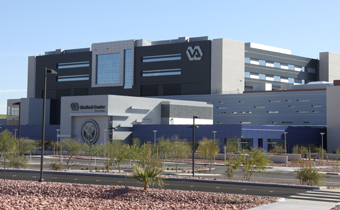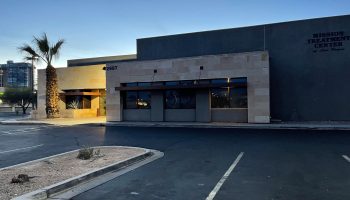North Las Vegas VA Medical Center

About North Las Vegas VA Medical Center
North Las Vegas VA Medical Center is an integrated healthcare care provider. They’re based in North Las Vegas, Nevada, and serve veterans from Henderson and Boulder City. From primary care to behavioral health treatment, they’re open 24/7. They have specialized programs available for underserved veterans, such as the homeless, victims of military sexual trauma, and the LGBTQ+ veteran community.
Accessing Care from Transportation to Telehealth
Another thing I noticed is how they make programs accessible. They accept Medicaid, Medicare and TRICARE. They can reimburse travel expenses if you come from afar or use ambulances or wheelchair vans. They can even arrange transportation for getting you to and from your VA appointment.
You might not need to go in at all. They offer home telehealth services and video conferencing. You can book appointments, undergo medical checkups, and coordinate care with providers without leaving home. Store and forward telehealth are available to securely send or receive health information from the VA. This is especially helpful if you live in a remote location.
Personalized Substance Use Treatment for Veterans
Outpatient addiction recovery is an integral component of their mental healthcare. You’ll first undergo a clinical evaluation so you and the team can create a treatment plan just for you. This mainly involves recovery focused group and individual therapy. The therapy is geared towards helping you tackle the underlying psychological issues contributing to your substance use and build strong coping skills.
They’ll also provide medication assisted treatment, especially if you’re dealing with opioids, alcohol or stimulants. Medication assisted recovery uses FDA-approved methadone, Suboxone and Vivitrol with counseling to curb cravings and withdrawal symptoms. This enables you to focus on counseling to address the psychological aspects of your addiction.
Whole Health and Complementary & Integrative Health
The VA has other plans that blend self-care with complementary therapies alongside conventional medical care. The program involves acupuncture to help you manage pains without drugs, meditation & mindfulness training, and massage. Yoga, tai chi and qi gong classes are part of the activities as well.
Through personalized care planning, their whole health team will employ activities that are complementary and integrative to your recovery. These also involve using herbs or natural products to manage pains, special dieting, deep breathing and acupressure. Their recreational and creative art therapy includes arts and crafts, pet therapy, and sports.
Veterans who misuse IV drugs are susceptible to infectious diseases like hepatitis, HIV/AIDS and tuberculosis. This is due to the sharing of needles and weakened immune system. They offer testing, screening and treatment for hepatitis C, HIV/AIDS and tuberculosis. They also provide compassionate counseling and preventive strategies that include wound care.
Recovery programs are complemented by the social support services accessible through their social work departments. This may include help with finances, safe housing, and home health care. They also offer employment assistance, legal aid, and transportation services.
| Levels of Care | Detox Service Setting | Programs | Payment Options | ||
|---|---|---|---|---|---|
|
Inpatient and residential programs provide round-the-clock medical and emotional support as you live at the treatment facility. This level of care may be recommended if you have severe addictions or mental health conditions since it removes outside distractions and allows you to focus solely on therapy. |
In outpatient therapy, you’ll attend therapy sessions several times each week while living at home. This is ideal if you have a strong support system and a lower risk of relapse. Outpatient treatment offers flexibility to maintain work, school or family obligations. |
Partial hospitalization programs provide comprehensive treatment in a structured setting during the day but allow you to return home at night. These programs offer a balance of inpatient and outpatient rehab and provide intensive support without full time residency. |
|||
|
Inpatient detox occurs in a dedicated treatment facility. You’ll live there around the clock and receive intensive medical support and supervision to help manage your withdrawal symptoms. It is suitable for individuals with moderate to severe addictions as it ensures a stable detox environment. |
Outpatient detox gives you access to medically supervised withdrawal services while still allowing you to live at home. You’ll attend a clinic for treatment and monitoring. This flexible option is suitable for those with mild to moderate withdrawal symptoms who have strong support systems. |
||||
|
Adult programs address the substance use and life challenges specific to adults. Therapists can deliver sessions in individual, group and family settings. Services often include job support and life skills training in a structured environment. |
Young adult programs are designed for individuals who are transitioning into adulthood. Topics of discussion typically include identity, independence and peer relationships. Providers may also offer life skills training and career support. |
Women's programs offer a safe and supportive space to focus on gender specific issues such as trauma, family roles and mental health conditions. Therapists tailor the sessions to address women's needs and foster empowerment in a healing and nurturing environment. |
Men's programs address substance use while also considering the social pressures, family roles and mental health concerns that are specific to men. You’ll learn healthy coping mechanisms as you build emotional resilience and develop communication skills. |
LGBTQ friendly programs create an inclusive and affirming space for recovery. Treatment is sensitive to issues like discrimination and stigma. You’ll receive support and therapy that respects and acknowledges your unique experiences. |
Military and veteran programs offer specialized support for clients who served in the armed services. Programs focus on reintegration and healing within a structured and supportive environment that acknowledges the unique struggles of military life. |
|
Medicaid
|
Medicare
|
State Family Services
|
Private Insurance
|
Military Insurance
|
Payment Assistance
|
Levels of Care
Inpatient and residential programs provide round-the-clock medical and emotional support as you live at the treatment facility. This level of care may be recommended if you have severe addictions or mental health conditions since it removes outside distractions and allows you to focus solely on therapy.
In outpatient therapy, you’ll attend therapy sessions several times each week while living at home. This is ideal if you have a strong support system and a lower risk of relapse. Outpatient treatment offers flexibility to maintain work, school or family obligations.
Partial hospitalization programs provide comprehensive treatment in a structured setting during the day but allow you to return home at night. These programs offer a balance of inpatient and outpatient rehab and provide intensive support without full time residency.
Detox Service Setting
Inpatient detox occurs in a dedicated treatment facility. You’ll live there around the clock and receive intensive medical support and supervision to help manage your withdrawal symptoms. It is suitable for individuals with moderate to severe addictions as it ensures a stable detox environment.
Outpatient detox gives you access to medically supervised withdrawal services while still allowing you to live at home. You’ll attend a clinic for treatment and monitoring. This flexible option is suitable for those with mild to moderate withdrawal symptoms who have strong support systems.
Programs
Adult programs address the substance use and life challenges specific to adults. Therapists can deliver sessions in individual, group and family settings. Services often include job support and life skills training in a structured environment.
Young adult programs are designed for individuals who are transitioning into adulthood. Topics of discussion typically include identity, independence and peer relationships. Providers may also offer life skills training and career support.
Women's programs offer a safe and supportive space to focus on gender specific issues such as trauma, family roles and mental health conditions. Therapists tailor the sessions to address women's needs and foster empowerment in a healing and nurturing environment.
Men's programs address substance use while also considering the social pressures, family roles and mental health concerns that are specific to men. You’ll learn healthy coping mechanisms as you build emotional resilience and develop communication skills.
LGBTQ friendly programs create an inclusive and affirming space for recovery. Treatment is sensitive to issues like discrimination and stigma. You’ll receive support and therapy that respects and acknowledges your unique experiences.
Military and veteran programs offer specialized support for clients who served in the armed services. Programs focus on reintegration and healing within a structured and supportive environment that acknowledges the unique struggles of military life.
Amenities
Accreditations
Contact
- Monday 7:30AM - 4PM
- Tuesday 7:30AM - 4PM
- Wednesday 7:30AM - 4PM
- Thursday 7:30AM - 4PM
- Friday 7:30AM - 4PM
- Saturday Closed
- Sunday Closed

Chika Uchendu is a multi-niche and seasoned SEO writer with expertise in personal finance, technology and health. He’s had over 10 years of experience creating impactful content that resonates with diverse audiences. His journalism and digital marketing background enables him to combine data-driven analysis with engaging storytelling. This helps drive engagement and grants target audiences access to valuable information.
Chika has worked for Benzinga, Motley Fool, Webopedia and many other popular online media outlets on a freelance and contractual basis. He is using his voice to drive awareness and meaningful change among people dealing with the pandemic of substance use disorder. Chika is an ambivert who enjoys sports, hiking, reading and video gaming.

Peter W.Y. Lee is a historian with a focus in American Cold War culture. He has examined how popular culture has served as a coping mechanism for the challenges and changes impacting American society throughout the twentieth century.




